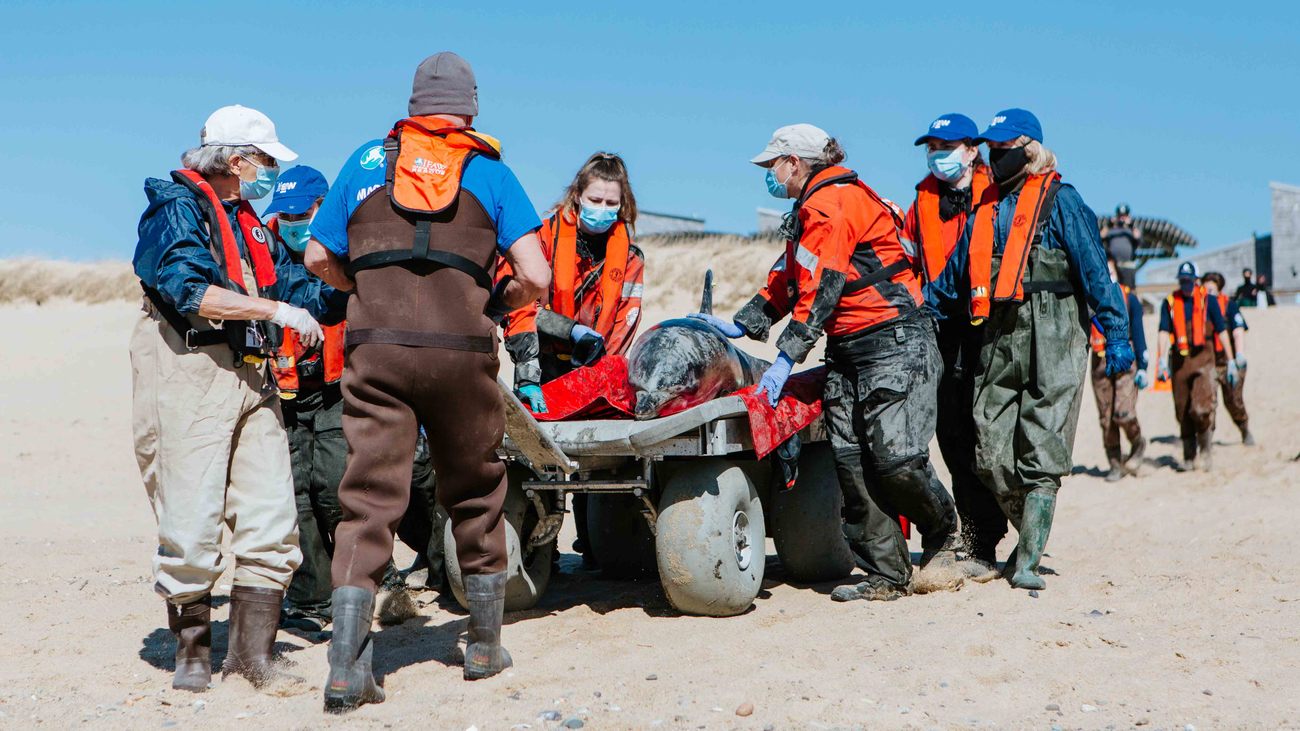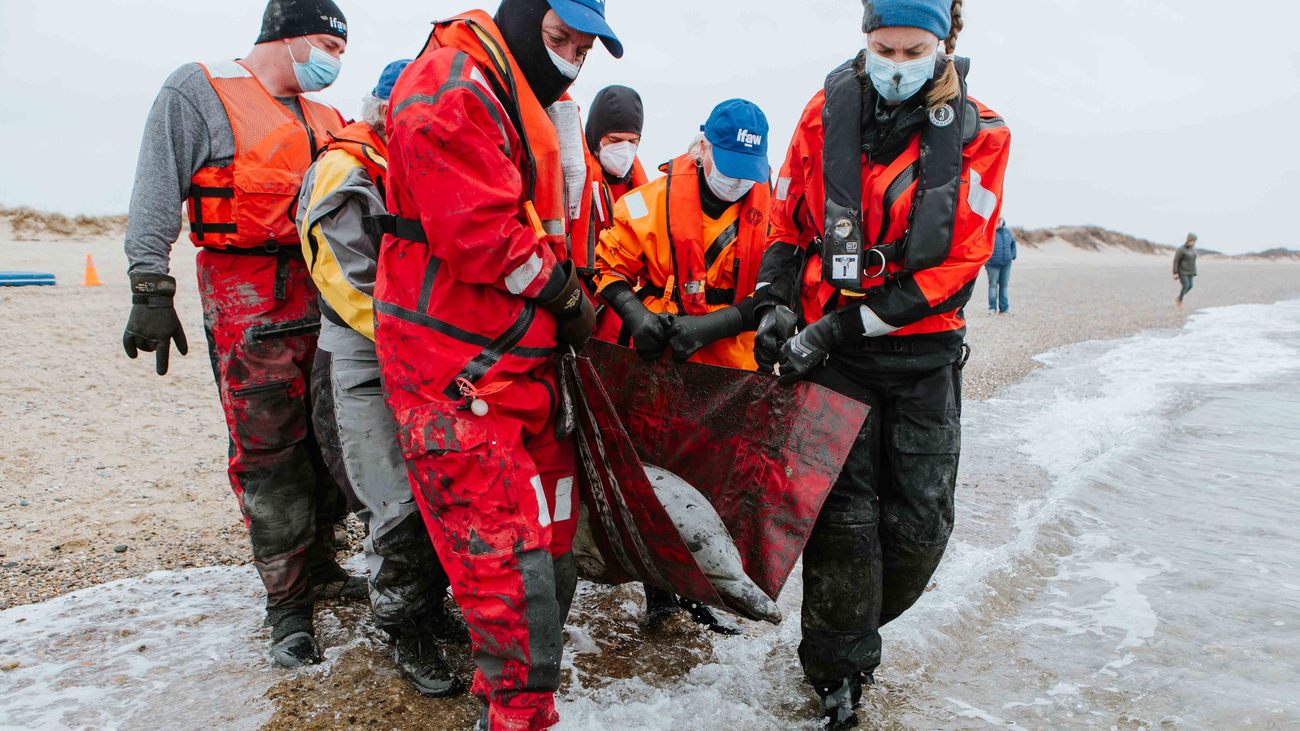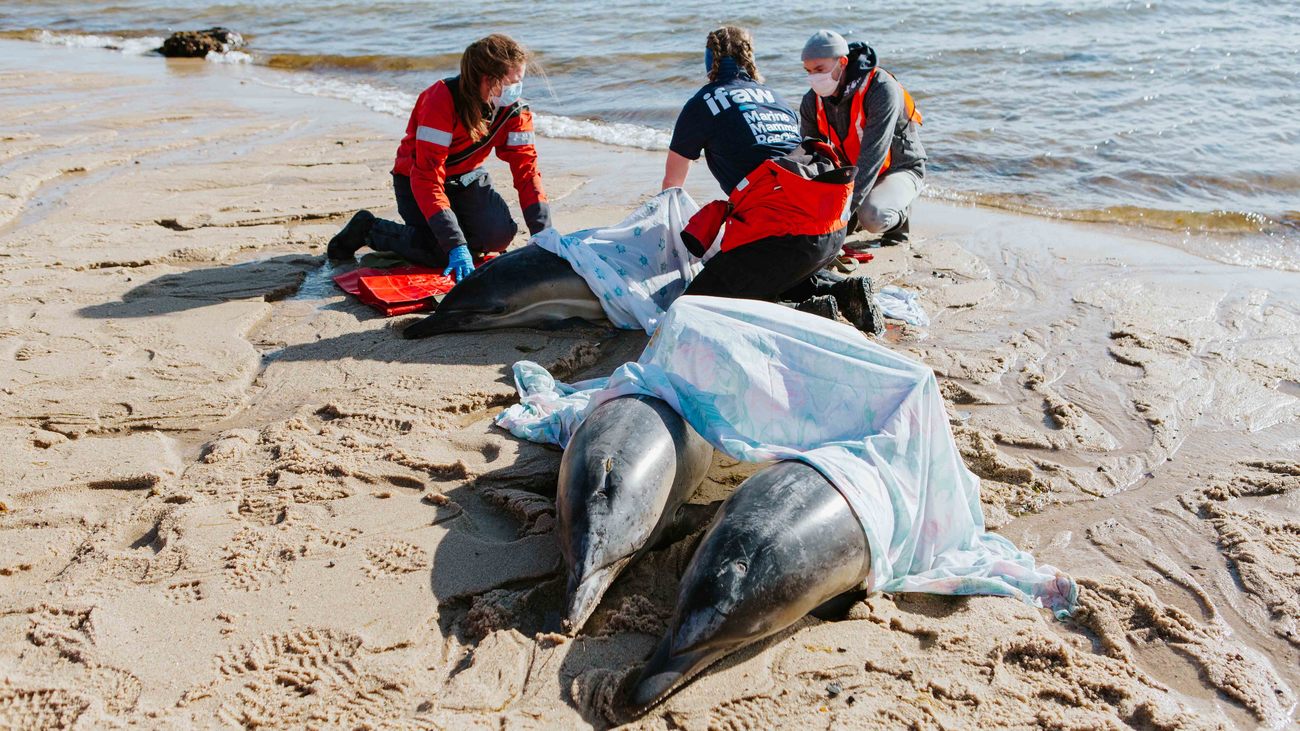Blog
Long’uro: one elephant’s story of immense resilience
Read moremeet ifaw's marine mammal rescue volunteers
As part of IFAW’s new Meet the Rescuers series, we wanted to start by introducing you to the 150+ volunteers who support our IFAW Marine Mammal Rescue & Research (MMRR) work on Cape Cod. Join us as we speak with volunteers directly and learn more about the team's beginnings, its inspirations, and what it takes to become a volunteer!

IFAW’s marine mammal rescue work originated with the Cape Cod Stranding Network in 1998. This was a group of three people working to address the growing need for a full-time marine mammal stranding response organization on Cape Cod, a location known for being one of the most frequent mass stranding hotspots in the world.
In 2007, IFAW—being a global animal welfare and conservation organization headquartered right nearby—stepped in to fund and grow the team to its current capacity, which consists of 10 full time staff members, two apprentices, and four to six interns across three sessions each year. The team operates a total of five vehicles and three boats. The now world-renowned IFAW Marine Mammal Rescue & Research team fields an average of 1,000 calls to our Stranding Hotline, responds to an average of 264 dolphins, whales and seal cases every year, and covers approximately 700 total miles of coastline across the region. The impact of the team extends to international training events, shared research and expertise, and the continued innovation and improvement to stranding response methods around the world.
While our staff and resources have grown—thanks to the support of donors and grants—our work wouldn’t be possible without a tremendous network of trained volunteer responders across Cape Cod and southeastern Massachusetts. When a call comes in, they are our first boots on the ground. It may be a report of live stranded dolphins, an entangled seal, or even a whale that is swimming too close to shore. Sometimes we find a healthy seal resting on a beach, or the animal in question is already dead. Our volunteers on scene are trained to perform a preliminary exam, collect data and educate the local public.
Despite challenges in the field and strenuous physical work of rescuing a large marine mammal, our volunteers put everything on the line to make a difference.
“It feels great to be part of a team that does the work we do," says Mark from Provincetown. "I am very proud to tell people that I am associated with IFAW. I've learned so very much about the animals we take care of and will continue to learn more through every response and training. Each response is different, based on where it happens and what type of animal needs to be helped. I love being able to share with family and friends the great work that IFAW does, from my own personal experience.”
James, a volunteer based in Provincetown, recalls, “I generally wanted to become more actively involved in working with marine life and when I moved to Provincetown, I remembered I had seen a release at Herring Cove many years ago. I researched IFAW and reached out looking for opportunities to volunteer. It has been one of the most amazing experiences of my life and I am so grateful to be able to volunteer for IFAW. My most memorable experience was being first on scene to a four-dolphin stranding and then working for hours with the team to release all of them successfully at Herring Cove as the sun was setting. It brought me to tears. It was the most amazing thing I've ever done.”

Once on scene for a mass stranding event, some volunteers provide supportive care to animals while others scout for additional stranded animals in the vicinity or find the best access point for our IFAW rescue vehicles. When it’s time to extract the animals out of thick mud, it’s all hands on-deck to help safely lift and move the dolphins to our mobile dolphin rescue clinic where volunteers are often asked to help with monitoring and data collection. Once all dolphins are extracted and carried to our rescue vehicles, volunteers make their way to the release site where they prepare to help lift and cart the dolphins down to the beach for release. Before releasing a dolphin, responders are required to be properly outfitted with appropriate gear including a dry suit or waders for cold water protection, PFDs, and other personal protective equipment to ensure humans and animals are safe. And finally it’s time for the dolphin to return back to the wild!
But no one event is ever “typical.” Meet Patty, who has been volunteering with us for 15 years. She began as a volunteer responder back when MMRR was the Cape Cod Stranding Network. Living in the Wellfleet area where many of our strandings occur, she is often one of the first on scene to provide supportive care to the animals and update the team as they prepare to deploy. She grew up body boarding along the New Jersey shore where dolphins were often spotted. She later worked as a nurse with small animals in an animal hospital in Boston. Eventually finding her way to Cape Cod, she read an article in a local newspaper about a stranding in Wellfleet and knew immediately that this was something she wanted to pursue.
"Sometimes a typical response is not a single day but a day that seems to go on for two, three or four days," explains Patty. "It can feel wild and crazy, but those are my favorite responses. I will never forget my first rescue and release. Nor will I forget some large mass strandings of 14 ,18, 24, 45 cetaceans—these are unforgettable."
"More frequent is what is called a “Level A” exam, conducting research on a deceased animal. It’s not always a lot of fun, but you get to take your time. You can look it over, see what the animal really looks like, see how many teeth a dolphin has, how big a seal's teeth are...when holding a seal's flipper, you can see how long and hand-like the flipper is, the webbing, how long the nails are, feel its fur. You can learn a lot from deceased marine mammals."
Our lifesaving efforts in the field and innovative research have revolutionized how marine mammals are rescued, assessed, and released. Challenging the long-standing belief that single stranded dolphins are sick and must be euthanized, the team pushed boundaries to pioneer field health assessments and revolutionize the way we treat stranded dolphins. Now, nearly 80% of stranded dolphins are able to be released back into the wild.
We wouldn't be where we are today without our incredible volunteers, and we make it a priority to let them know how grateful we are for their support. “Working with IFAW is not only rewarding in what we accomplish in rescues, but is also rewarding in working with people I respect and appreciate," says John, a MMRR volunteer from Wellfleet. "Volunteers are treated with respect and equality by the professional IFAW staff and because of it feel our involvement is appreciated and recognized. Although I have the utmost respect for the professional staff, I also have tremendous respect and admiration for my fellow volunteers. We are a community and one of which I am proud to be identified. My fellow volunteers are knowledgeable, capable, dedicated and impressively hard working. IFAW MMRR does amazing good work. It also does it well.”
Volunteers Barbara and Nick share a similar love for their teammates and the adventure. "We are proud to be part of the team, whether we are actually part of the extraction and release of dolphins, or educating beach goers about what is going on as they pass by and see all the IFAW staff and volunteers. Our favorite dinner table stories involve mud, mud and more mud and the difficulty of some of the rescue operations in certain areas of Wellfleet.”

So, what exactly does it take to be a marine mammal rescue volunteer?
Anyone is welcome and encouraged to apply to become a volunteer for our program! At minimum, we require our volunteers to be 18 years of age, live within our coverage area of Cape Cod and southeastern Massachusetts, and attend at least one training per year to maintain an active volunteer status.
There are several types of volunteer roles with our team—some more physical than others. Would you like to get down and dirty in the mud saving animals, or might you prefer to help educate and engage with the community through a booth at an outreach event? Perhaps you'd like to lend your skills to help record vital data at a necropsy (animal autopsy), or assist in assessing the health and condition of a live seal reported to our Stranding Hotline.
We offer at least one new volunteer training session each year, consisting of in-person or virtual responder trainings that cover everything involved in a stranding response. Once active, we offer a variety of in-person and virtual training opportunities throughout the year to ensure responders have ample opportunity to attend and learn more.
Our work can’t get done without you. Please give what you can to help animals thrive.
Unfortunately, the browser you use is outdated and does not allow you to display the site correctly. Please install any of the modern browsers, for example:
Google Chrome Firefox Safari